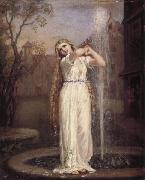
Oil On
Canvas, Real Flavor of Old Masters
|
John William Waterhouse
|
|||
|
|
|||
| English Pre-Raphaelite Painter, 1849-1917 English painter. His father was a minor English painter working in Rome. Waterhouse entered the Royal Academy Schools in London in 1870. He exhibited at the Society of British Artists from 1872 and at the Royal Academy from 1874. From 1877 to the 1880s he regularly travelled abroad, particularly to Italy. In the early 1870s he had produced a few uncharacteristic Orientalist keepsake paintings, but most of his works in this period are scenes from ancient history or classical genre subjects, similar to the work of Lawrence Alma-Tadema (e.g. Consulting the Oracle, c. 1882; London, Tate). However, Waterhouse consistently painted on a larger scale than Alma-Tadema. His brushwork is bolder, his sunlight casts harsher shadows and his history paintings are more dramatic. | |||
|
|
|||
|
|
Undine new3/John William Waterhouse-684669.jpg Painting ID:: 27638 Visit European Gallery |
mk58 1872 oil on canvas 25.4x20.3cm | |
Height Width |
INS/CM |
||
|
X |
|
||
|
|
|||
|
Carl Wilhelmson
|
|||
|
|
|||
| 1866-1928 Swedish painter and lithographer. Wilhelmson trained first as a commercial lithographer in Göteborg. In 1886 he enrolled as a student of decorative painting at Valand College of Art where his teacher was Carl (Olof) Larsson. In 1888, having obtained a travel grant, he went to Leipzig to study lithographic technique. From 1890 to 1896 he lived in Paris, where he worked as a lithographer and commercial artist and studied at the Academie Julian. Wilhelmson's preferred subject-matter was the coastal landscape of Bohuslen and the people of its little fishing villages with their huddles of wooden houses. There is no trace of ethnography in his depictions of local life; they are full of serious realism and display a sensitive insight into the perilous life of the fishermen, with which he had been familiar since childhood. In the Village Shop | |||
|
|
|||
|
|
undine new22/Carl Wilhelmson-543838.jpg Painting ID:: 65577 Visit European Gallery |
1898 se | |
Height Width |
INS/CM |
||
|
X |
|
||
|
|
|||








